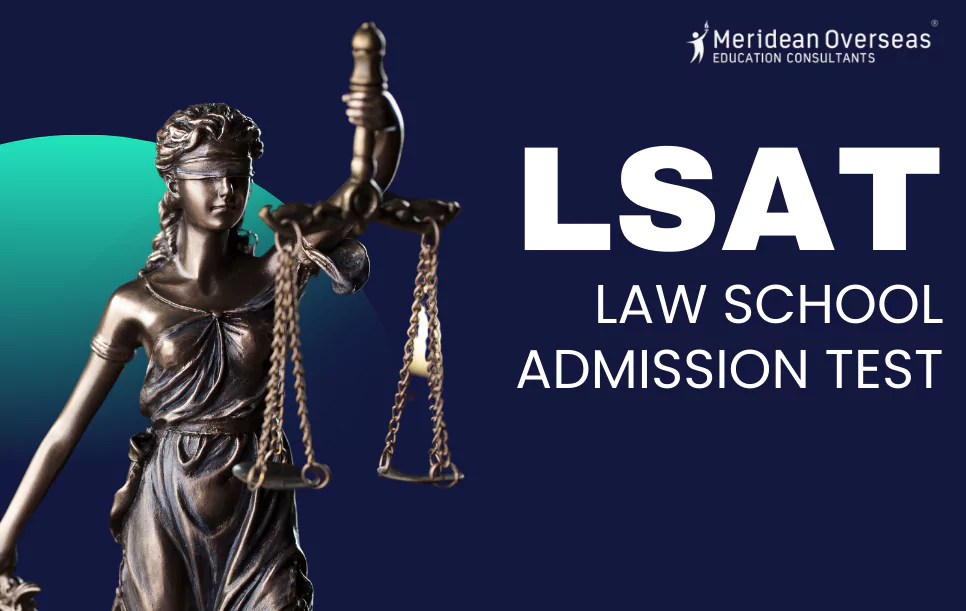
Announcements

Announcements



Law sstands for Law School Admission Test, is administered by the Law School Admission Council (LSAC) as a uniform test. The Law School Admission Test (LSAT), given many times a year, is widely considered the most reliable, efficient, and equitable way to evaluate applicants who want to attend reputable law schools worldwide.
The admission exam is carefully designed to assess verbal thinking and critical reading abilities, which are thought necessary for law school success. Because the digital LSAT is remotely proctored, students can comfortably attempt it from their homes or at authorised test locations.
|
Aspect |
LSAT details |
|
Conducting Body |
Law School Admission Council (LSAC) |
|
Mode |
Computer-based (Digital LSAT) |
|
Exam fee |
INR 3,999 |
|
Scoring |
120-180 |
|
Accepting countries |
Global |
|
Duration |
Approximately 3 hours, 30 minutes (including breaks) |
When navigating the Law School Admission Test (LSAT), it is critical to comprehend the various exam formats. Every variation has a distinct function and adjusts to the changing legal assessment and instruction environment.
|
LSAT-Flex |
Introduced in response to the COVID-19 pandemic, LSAT-Flex is an online, remotely proctored version of the LSAT. It includes three sections: Logical Reasoning, Analytical Reasoning, and Reading Comprehension. |
|
LSAT Writing |
The LSAT Writing is a separate component that assesses the candidate’s ability to produce a written response in an impromptu, timed setting. It is a required part of the LSAT and is administered separately from the main test. |
|
LSAT-India |
The LSAT-India, tailored specifically for Indian law school aspirants, assesses critical thinking and analytical reasoning skills. It includes sections on analytical reasoning, logical reasoning, and reading comprehension. |
The four main 35-minute sections of the Law School Admission Test (LSAT) comprise its core. Each section is carefully crafted to evaluate particular abilities necessary for achieving success in legal education.
Reading Comprehension
Candidates must read complex legal materials in Reading Comprehension. They have 35 minutes to quickly gather essential data, recognise important concepts, and draw deft conclusions, a pace similar to legal reading and analysis.
Analytical Reasoning
The "Logic Games" portion of the Analytical Reasoning section requires quick problem-solving. Examinees must solve challenging logic puzzles in 35 minutes or less, demonstrating their grasp of intricate relationships and applying logical principles—a critical aptitude for legal analysis.
LSAT Writing
Even though it's not a graded section, LSAT Writing presents a special difficulty. Candidates have 35 minutes to craft a strong written response that demonstrates their ability to provide a cogent case in a limited amount of time. It's a test of their ability to communicate concisely and clearly. Successful completion of the LSAT requires mastery of these four 35-minute test portions. One of the most important abilities required in legal practice and education is the capacity to quickly and accurately understand complicated legal circumstances.
Logical Reasoning
In the Logical Reasoning section, candidates must critically assess various arguments. They have 35 minutes to analyse logical frameworks, spot errors, and reach wise conclusions. It's a quick yet accurate test of legal thinking.
The LSAT is graded from 120 to 180 on a point system determined by how many questions are answered correctly. The table below shows the candidate's analytical and logical reasoning skills essential for law school success.
|
LSAT exam score |
Result Interpretation |
|
120-130 |
Limited Understanding: Significant gaps in analytical and logical reasoning skills. Further preparation is recommended. |
|
131-140 |
Essential Understanding: Some grasp of fundamental concepts, but improvement is needed for a competitive application. |
|
141-150 |
Developing Competence: A reasonable understanding, with potential for improvement in critical thinking abilities. |
|
151-160 |
Strong Competence: Solid analytical and logical reasoning skills, demonstrating a competitive aptitude for legal studies. |
|
161-170 |
Advanced Competence: Exceptional proficiency, positioning the candidate well for admission to reputable law schools. |
|
171-180 |
Outstanding Competence: Virtually flawless performance indicates an elite analytical and logical reasoning level. |
As of 2024, there are no rigid restrictions on how many times a candidate can take the LSAT. It's best to inquire with specific law schools, though, as some might consider this. Understanding these criteria is crucial for prospective test-takers; the table below will help you understand it.
|
Age limit |
There is no specified age limit for taking the LSAT. Candidates of all age groups are welcome to register and attempt the test, provided they meet other eligibility criteria |
|
Educational Qualifications |
Candidates must have completed at least their secondary education to be eligible for the LSAT in 2024. The exact academic qualifications may vary, so it’s essential to check the specific requirements outlined by the Law School Admission Council (LSAC) or the official LSAT website. |
The cost of the LSAT exam varies worldwide because of living expenses, exchange rates, and regional economic conditions. The lower cost in India results from lower living expenditures, lower testing costs, and a deliberate effort to improve accessibility in legal education exams. These fee adjustments attempt to promote diversity in legal education efforts by accommodating a range of economic realities.
|
United States |
INR 18,500 |
|
Canada |
INR 19,800 |
|
United Kingdom |
INR 16,000 |
|
India |
Discounted fees: INR 3,499 Regular fees: INR 3,999 (without discount) Fees for January + May sessions: INR 7,998 |
|
Australia |
INR 24,000 |
|
Singapore |
INR 21,500 |
|
Germany |
INR 20,700 |
|
South Africa |
INR 15,600 |
|
Brazil |
INR 17,300 |
Focus on weak areas - To maximise your preparation, identify your weakest points and work on improving them.
Seek Advice - For more specialised advice, think about seeking the help of LSAT tutors or preparing classes.
Start early - Start your LSAT preparation far in advance so that you have time to review the entire syllabus.
Time management - To effectively traverse the time-constrained areas of the LSAT, develop good time management abilities.
Practice regularly - Regular practice using LSAT sample papers and practice tests improves your understanding of the test format.

Contact MOEC Experts for Study Abroad Guidance!
By using our site, you agree to our use of cookies.

Hurry up before admissions close.


Post Comment